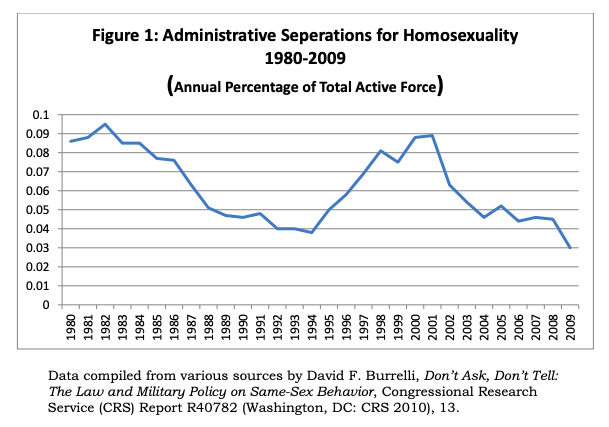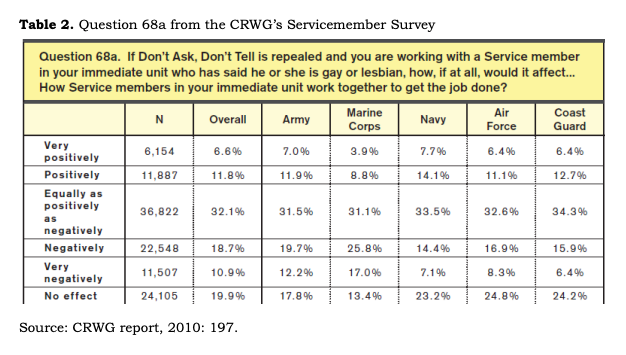More than 10 years after the repeal of “Don’t Ask Don’t Tell” (DADT), the 1994 law that banned gay and bisexual service members from serving in the military, a publicly released historical study has found that conservative fears about repealing the law were unfounded.
The 196-page study, started in 2012 and published in 2021, was commissioned by the office of the Joint Chiefs of Staff: the heads of the U.S. Army, Navy, Air Force, and Marine Corps. The study found that repealing the ban had no negative impact on military readiness, effectiveness, or unit cohesion, despite worries to the contrary, Military Times reports.
In a December 2010 Senate vote, eight Republican senators crossed party lines to repeal the ban in a 65-31 vote. Four days later, President Obama signed the repeal into law. The next year, the DOD created a Support Plan for Implementation of the repeal. The full repeal went into effect on September 20, 2011.
It turned out repeal didn’t disrupt the military at all
Two months after the repeal went into effect, Marine Corps General James Amos told the press that the policy change had been a “non-event” and that his worries about its negative effects were “misplaced.”
Never Miss a Beat
Subscribe to our newsletter to stay ahead of the latest LGBTQ+ political news and insights.
A 2013 memo from Army General Martin Dempsey, the then-chairman of the Joint Chiefs of Staff, to Defense Secretary Leon Panetta noted that combatant commanders military-wide said that the repeal “had no impact to military readiness, effectiveness, or unit cohesion.”
Aaron Belkin, director of the now-defunct Palm Center – a pro-LGBTQ military policy organization — told Military Times of the report’s findings, “Time and again, opponents of equality have claimed that inclusion would harm America’s most important institutions and threaten the nation itself. And time and again, that’s turned out to be false.”
Belkin added that the overblown fears of the repeal’s effects should apply to worries of transgender soldiers serving in the military.
“This official military study makes clear the yawning gap between fear-mongering and reality, and should guide dialogue about similar claims in the present,” Belkin said.
Obama had set plans into motion to allow trans soldiers to serve openly during his presidency. But in 2017, then-President Donald Trump announced a ban on trans soldiers via Twitter, claiming that it was too costly for the military to fund transition-related care. (In truth, the military spent more on erectile dysfunction medication than it did on trans healthcare.)
President Joe Biden repealed Trump’s ban in January 2021 during his first day in office.
A quick history of DADT’s creation and repeal
The study noted that the U.S. military policy of dishonorably discharging out service members dates back to 1947, two years after the end of World War II. Out servicemembers began suing over the policy during the ’60s and ’70s, saying it violated individual rights to free expression, equal protection, and due process.
A 1981 directive from then-Deputy Secretary of Defense W. Graham Claytor Jr. changed the policy somewhat, stating the ban was necessary, not because homosexuals were individually unfit to serve but because their presence “seriously impairs the accomplishment of the military mission.” This made the policy easier for the government to defend in court without having to provide any scientific evidence to justify it.
In 1991, amid growing public acceptance of gay people in the U.S., two significant things happened: then-Democratic presidential candidate Bill Clinton pledged to repeal the ban and the Government Accountability Office released a report suggesting that the ban be revised because foreign militaries had successfully integrated gay soldiers and kicking out already-trained soldiers wasted a significant amount of money.
By the time Clinton became president in 1992, the Joint Chiefs of Staff and Republican congressmen openly opposed his push for repeal. In response, Clinton and legislators came up with DADT, a “compromise” law that allowed homosexuals and bisexuals to serve, albeit not openly.
By 1998, Clinton admitted that the so-called compromise hadn’t functioned like he thought it would. The erratically applied policy more than doubled the number of LGB people dishonorably discharged from the military and increased anti-gay sentiment in the ranks. It also led to LGB servicemembers having to lie and stay closeted while they risked being blackmailed, interrogated, and threatened with violence from fellow servicemembers.
Interestingly, the so-called War on Terror, which followed the 2001 terrorist attacks on the World Trade Center, led to the lowest number of discharged gay and bi soldiers in nearly 30 years. This was likely due to them staying closeted and commanders not discharging qualified soldiers. Regardless, it undermined the claim that out servicemembers undermined military readiness.

Concurrently, gay activists and groups like the Servicemembers League Defense Network increased public condemnation of the policy, stating that tens of thousands of gay military members had already successfully served with some degree of outness (and no serious repercussions). These groups also noted that the policy undermined the U.S. military’s supposed virtues of truth, honor, dignity, and respect.
The ban’s defenders continued publicly calling homosexuality “immoral,” arguing in court that a repeal would be difficult to enforce since the U.S. military was very large and also engaged in an endless Afghanistan conflict. They also argued it would cost the military millions to extend benefits to same-sex partners.
Nevertheless, by 2008, then-Democratic presidential candidate Barack Obama pledged to repeal DADT, in “a thoughtful and principled way.” In 2010, the Joint Chiefs of Staff began studying a repeal, asking servicemembers for feedback.
One survey conducted by the Department of Defense’s (DOD) Comprehensive Review Working Group (CRWG) found that majorities of servicemembers in all military branches thought serving alongside out soldiers would negatively impact their performance.
The same study showed that servicemembers who had actually served with gay soldiers were less pessimistic. The study concluded that repeal wouldn’t negatively affect readiness, effectiveness, or cohesion. Such fears, the study said, were based on anecdotal and “reactionary” misunderstandings, similar to historic fears before allowing Black people and women to serve.

Don't forget to share:












